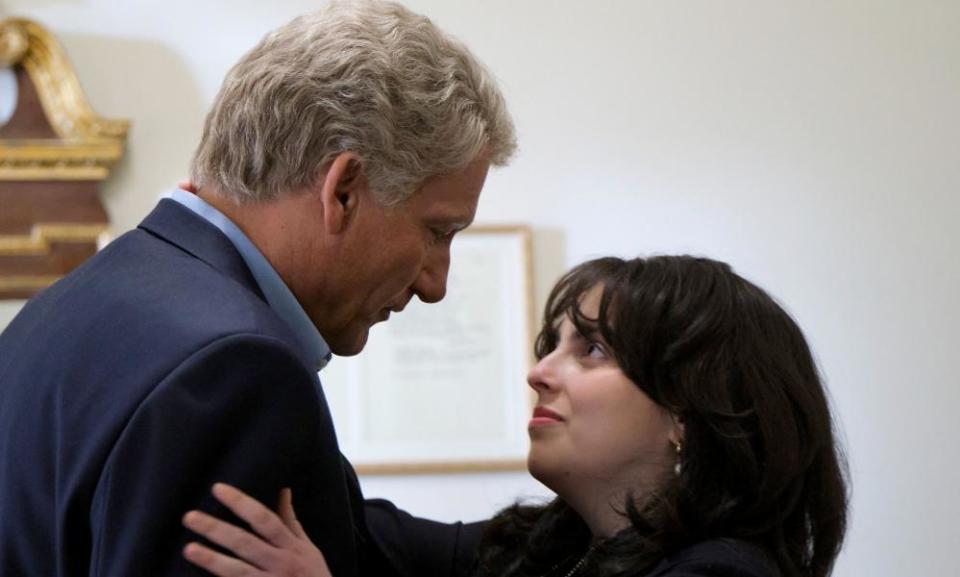Impeachment: American Crime Story review – Clinton-Lewinsky drama is a salacious sensation

There is nothing stranger than the recent past. For that reason, it can be a goldmine for writers, and none has extracted more from it in the past few years than Ryan Murphy. The late 90s is his most fertile seam, furnishing all three parts of his American Crime Story anthology. The opening season gave him his first – and unexpected – post-Glee hit in the glorious The People v OJ Simpson, which retold the story of the 1994 killing of Nicole Brown and Ron Goldman and the most infamous murder trial of modern (media) times that followed. Then came The Assassination of Gianni Versace, about the death of the designer at the hands of Andrew Cunanan in 1997. Now we have Impeachment (BBC Two), which focuses on the Clinton-Lewinsky scandal that occupied minds, headlines and the House of Representatives for much of 1998.
This new 10-part instalment, written mainly by Sarah Burgess, puts the bureaucrat Linda Tripp – played by the most revered of his repertory company, Sarah Paulson – rather than the US president or his intern front and centre. The drama opens in 1998 with her leading the FBI to Monica (Beanie Feldstein) and leading her away to a hotel for questioning (“It’s for your own good,” Tripp assures her) as part of the Paula Jones investigation and pending lawsuit. We then move back to 1993, the suicide of Vince Foster and the Whitewater investigation, presented as the beginning of Tripp’s move from loyal (if abrasive and self-aggrandising) White House civil servant to embittered employee ready to put a metaphorical bomb under the place.
Tripp died last year and – whatever your politics or memory of the time – it is hard to watch Impeachment without feeling that this has freed its creators to treat the character cruelly. We are shown her snacking or eating dismal microwaved meals at every opportunity (Paulson has apologised for wearing a fat suit to portray her) and even with an actor as good as Paulson wringing all available nuance from the script, Tripp remains perilously close to bitter-hag territory. She is an avatar of the unfulfilled middle age that must surely lie in wait for every woman who does not bother to bring sweetness and light to all while she has the chance.
In that sense, it is a weaker instalment than The People v OJ Simpson, which tended to round out and look anew at people who had long been reduced by popular culture to caricatures. But it holds up well in terms of propulsive, addictive drama. It’s a rich, soapy lather shot through with comedy and an irresistible wholeheartedness. And knowing the outcome only adds to, rather than lessens, the fun. You can hardly look away as the dominoes are tantalisingly set up. Tripp is unceremoniously ejected from her glamorous White House job, where she had served under Bush, and exiled to the Pentagon. She meets the literary agent Lucianne Goldberg (the mighty Margo Martindale), who urges her to start writing down an insider’s account of political life in the hope of a book deal. After two years of stewing in her dead-end job while the Clinton administration undoes America around her, she meets lonely 22-year-old Monica – also exiled to the Pentagon, though for very different reasons – who is eager for a friend. Especially one so willing to listen to her trials as a young woman in love with a married, much more powerful man.
Meanwhile, in Arkansas, former state employee Jones (Annaleigh Ashford) is getting ready to sue the president for sexual harassment. Or rather, other people – eventually with the backing of Republicans led by Ann Coulter (Cobie Smulders) – are getting her ready to sue the president. Jones herself can hardly bring herself to describe what the then-governor did. But she can, she offers, draw his penis. “It takes a dramatic turn.”
Like The People and, to a lesser extent, Versace, Impeachment offers us the chance to look at ourselves and at pivotal historical moments and re-examine the critical lenses through which we saw them. It doesn’t grapple as closely with the underlying issue of misogyny that caused Lewinsky’s life to be upended and borderline ruined as it did with race relations and homophobia in the previous seasons – although by making Tripp the main character it also sidesteps a lot of potential prurience-traps – but as sheer entertainment it is almost back to top Murphy form.

 Yahoo News
Yahoo News 